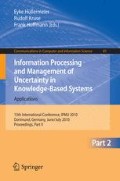Abstract
In the present paper the question whether uncertainty and fuzziness present themselves and behave in the same way (or not) in hard and human sciences will be briefly discussed. This problem came out from the attempt to answer the question asked by Lotfi Zadeh on the (apparent) strangeness of a very limited use of fuzzy sets in human sciences.
Access this chapter
Tax calculation will be finalised at checkout
Purchases are for personal use only
Preview
Unable to display preview. Download preview PDF.
References
Seising, R.: The Fuzzification of Systems. Springer, Heidelberg (2007)
Seising, R. (ed.): Views on Fuzzy Sets and Systems from Different Perspectives. Springer, Heidelberg (2009)
Snow, C.P.: The Two Cultures and the Scientific Revolution. Cambridge University Press, Cambridge (1959)
Greco, P.: L’astro narrante. Springer, Milan (2009)
Greco, P.: L’idea pericolosa di Galileo. Storia della comunicazione della scienza nel Seicento. UTET, Turin (2009)
Termini, S.: Imagination and Rigor: their interaction along the way to measuring fuzziness and doing other strange things. In: Termini, S. (ed.) Imagination and Rigor, pp. 157–176. Springer, Milan (2006)
Termini, S.: Remarks on the development of Cybernetics. Scientiae Matematicae Japonicae 64(2), 461–468 (2006)
Tamburrini, G., Termini, S.: Do Cybernetics, System Science and Fuzzy Sets share some epistemological problems? I. An analysis of Cybernetics. In: Proc. of the 26th Annual Meeting Society for General Systems Research, Washington, D.C., January 5-9, pp. 460–464 (1982)
Termini, S.: Explicandum vs Explicatum and Soft Computing. In: Seising, R., Sanz, V. (eds.) Proceedings of the I. International Seminar on Soft Computing in Humanities and Social Sciences. Springer, Heidelberg (2010) (to appear)
Termini, S.: The formalization of vague concepts and the traditional conceptual framework of mathematics. In: Proc. VII International Congress of Logic, Methodology and Philosophy of Science, Salzburg, vol. 3, section 6, pp. 258–261 (1983)
Tamburrini, G., Termini, S.: Some Foundational Problems in the Formalization of Vagueness. In: Gupta, M.M., Sanchez, E. (eds.) Fuzzy Information and Decision Processes, pp. 161–166. North-Holland, Amsterdam (1982)
Terricabras, J.M., Trillas, E.: Some remarks on vague predicates. Theoria 10, 1–12 (1988)
Termini, S.: Aspects of vagueness and some epistemological problems related to their formalization. In: Skala, H.J., Termini, S., Trillas, E. (eds.) Aspects of Vagueness, pp. 205–230. D. Reidel (1984)
Termini, S.: Vagueness in Scientific Theories. In: Singh, M.G. (ed.) Encyclopedia of Systems and Control, pp. 4993–4996. Pergamon Press, Oxford (1988)
Kluck, N.: Some Notes on the Value of Vagueness in Everyday Communication. In: Hüllermeier, E., Kruse, R., Hoffmann, F. (eds.) IPMU 2010, Part I. CCIS, vol. 80, pp. 65–84. Springer, Heidelberg (2010)
Trillas, E.: Non contradiction, Excluded middle and Fuzzy sets. In: Di Gesù, V., Pal, S.K., Petrosino, A. (eds.) Fuzzy Logic and Applications. LNCS (LNAI), vol. 5571, pp. 1–11. Springer, Heidelberg (2009)
Lukasiewicz, J.: Philosophical remarks on many-valued systems of propositional logic. In: Borkowski, L. (ed.) J. Lukasiewicz Selected Works, pp. 153–178. North-Holland, Amsterdam (1970)
De Luca, A., Termini, S.: A definition of a non probabilistic entropy in the setting of fuzzy sets theory. Information and Control 20, 301–312 (1972)
De Luca, A., Termini, S.: Entropy and energy measures of a fuzzy set. In: Gupta, M.M., Ragade, R.K., Yager, R.R. (eds.) Advances in Fuzzy Set Theory and Applications, pp. 321–338. North-Holland, Amsterdam (1979)
De Luca, A., Termini, S.: Entropy Measures in the Theory of Fuzzy Sets. In: Singh, M.G. (ed.) Encyclopedia of Systems and Control, pp. 1467–1473. Pergamon Press, Oxford (1988)
Arnheim, R.: Entropy and Art: An Essay on Disorder and Order. The University of California Press, Berkeley (1971)
Termini, S.: On some vagaries of vagueness and information. Annals of Mathematics and Artificial Intelligence 35, 343–355 (2002)
Zadeh, L.A.: Fuzzy sets. Information and Control 8, 338–353 (1965)
Zadeh, L. A.: Foreword. In: Dubois, D., Prade, H. (eds.): Fundamentals of Fuzzy Sets. Kluwer Academic Publishers, Dordrecht (2000)
Zadeh, L.A.: From Computing with Numbers to Computing with Words—from Manipulation of Measurements to Manipulation of Perceptions. Int. J. Appl. Math. Comput. Sci. 12, 307–324 (2002)
Author information
Authors and Affiliations
Editor information
Editors and Affiliations
Rights and permissions
Copyright information
© 2010 Springer-Verlag Berlin Heidelberg
About this paper
Cite this paper
Termini, S. (2010). Do Uncertainty and Fuzziness Present Themselves (and Behave) in the Same Way in Hard and Human Sciences?. In: Hüllermeier, E., Kruse, R., Hoffmann, F. (eds) Information Processing and Management of Uncertainty in Knowledge-Based Systems. Applications. IPMU 2010. Communications in Computer and Information Science, vol 81. Springer, Berlin, Heidelberg. https://doi.org/10.1007/978-3-642-14058-7_34
Download citation
DOI: https://doi.org/10.1007/978-3-642-14058-7_34
Publisher Name: Springer, Berlin, Heidelberg
Print ISBN: 978-3-642-14057-0
Online ISBN: 978-3-642-14058-7
eBook Packages: Computer ScienceComputer Science (R0)

